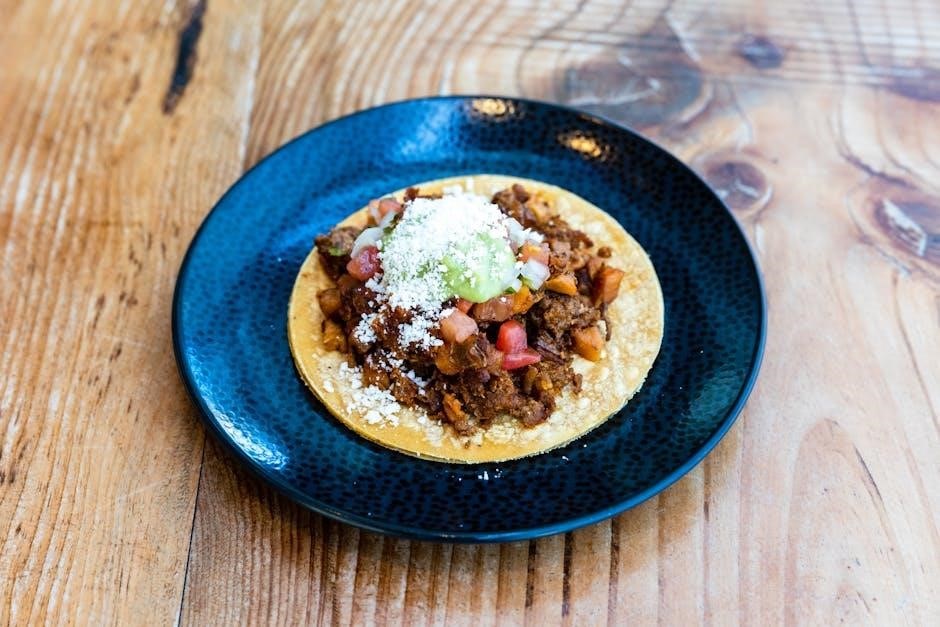taco del mar nutrition guide
Taco del Mar’s Nutrition Guide is your ultimate resource for making informed choices․ Learn about nutrition facts, portion sizes, and how to customize meals for a healthier diet․
1․1 Overview of Taco del Mar Menu
Taco del Mar offers a diverse menu featuring tacos, burritos, nachos, quesadillas, and more․ Their options cater to various tastes, including beef, chicken, veggie, and specialty choices․ The menu emphasizes fresh ingredients and customizable selections, allowing diners to tailor their meals․ Popular items like the Baja Burrito and Crispy Taco showcase their commitment to flavor and variety․ Additionally, Taco del Mar provides options for dietary preferences, such as vegan and gluten-free dishes․ This versatility ensures there’s something for everyone, making it easy to enjoy a satisfying meal while staying mindful of nutritional goals․
1․2 Importance of Nutrition in Fast Food Choices
Nutrition plays a vital role in fast food decisions, ensuring meals align with health goals․ Understanding the nutritional content helps diners make informed choices, balancing flavor with wellness․ Even in convenient options like Taco del Mar, being mindful of calories, proteins, and fats is key․ Reading labels and portion sizes aids in avoiding overconsumption․ Prioritizing whole ingredients and limiting added sauces or cheeses can enhance meal quality․ Making nutrition a priority fosters better eating habits and supports overall well-being, proving that fast food can be both satisfying and healthy when chosen wisely․

Understanding Nutrition Basics
Understanding nutrition basics involves learning about macronutrients, calories, and their impact on health․ This knowledge empowers diners to make informed choices when selecting meals at Taco del Mar․
2․1 How to Read Nutrition Facts Labels
Reading nutrition facts labels is essential for making informed choices․ Start with the serving size and total calories, then check macronutrients like protein, fat, and carbohydrates․ Pay attention to percentages of daily values to gauge nutrient intake․ Be mindful of added sugars, sodium, and cholesterol․ Ingredients are listed by quantity, helping identify key components․ Familiarize yourself with allergen information to avoid potential sensitivities․ Understanding these elements allows you to align your meals with dietary goals, whether managing weight, reducing sodium, or controlling sugar intake․ This skill is crucial for dining at Taco del Mar and beyond․
2․2 Key Nutrients to Focus On: Calories, Protein, and Fat
When evaluating Taco del Mar menu items, focus on calories, protein, and fat to make informed decisions․ calories indicate energy content, essential for managing weight and energy levels․ protein is vital for muscle repair and satiety, with options like lean meats or plant-based alternatives․ fat contributes to flavor and satisfaction, but opt for unsaturated fats over saturated ones for better heart health․ Balancing these nutrients helps align meals with dietary goals, whether aiming for weight management, muscle maintenance, or overall wellness․ Understanding these key nutrients empowers you to choose meals that satisfy both taste and nutrition needs at Taco del Mar․
2;3 Understanding Serving Sizes and Portions
Understanding serving sizes and portions is crucial for accurate nutrition tracking․ A serving size is a standard measure of food, while portions are the actual amounts consumed․ Taco del Mar menu items often exceed single servings, so checking the nutrition label helps gauge intake․ For example, a taco may be one serving, but adding extras like guacamole or sour cream increases calories and fat․ Portion control is key to maintaining a balanced diet․ By recognizing serving sizes and adjusting portions, you can enjoy Taco del Mar meals mindfully, ensuring healthier choices without sacrificing flavor․
Popular Taco del Mar Menu Items: Nutritional Breakdown
Explore the nutritional profiles of Taco del Mar’s signature dishes․ From tacos to burritos, discover the calorie, protein, and fat content to make informed choices․
3․1 Tacos: Soft Shell, Hard Shell, and Specialties
Taco del Mar offers a variety of tacos, each with unique nutritional profiles․ Soft shell tacos are lower in calories and fat compared to hard shell options, which contain more carbohydrates․ Specialty tacos, like grilled fish or chicken, provide lean protein sources․ Toppings such as lettuce, tomatoes, and salsa add vitamins and fiber without significant calorie increases․ Customize your taco by choosing whole wheat tortillas or skipping cheese for a healthier option․ Understanding the nutritional differences helps you make informed choices that align with your dietary goals․
3․2 Burritos: Beef, Chicken, and Veggie Options
Taco del Mar burritos vary significantly in nutritional content based on protein choices․ Beef burritos tend to be higher in calories and fat, offering around 450-550 calories per serving, with significant protein content․ Chicken burritos are slightly leaner, providing approximately 400-500 calories, with lower fat but similar protein levels․ Veggie burritos are the healthiest option, often under 400 calories, rich in fiber and plant-based nutrients․ Customize by adding guacamole for healthy fats or salsa for extra flavor without added calories․ Understanding these options helps balance your meal while meeting dietary preferences and nutritional goals․
3․3 Nachos and Quesadillas: Nutritional Comparison
Nachos and quesadillas are popular at Taco del Mar, but their nutritional profiles differ․ Nachos typically range from 400 to 600 calories, high in fat due to cheese and tortilla chips․ Quesadillas, especially veggie options, may offer fewer calories (around 350-450) but still contain significant fat․ Both can be customized for better nutrition—opt for lighter toppings like salsa or guacamole for added flavor without excess calories․ For a healthier choice, consider whole wheat tortillas or reduced cheese․ Balancing these options with lean proteins or vegetables helps maintain a balanced meal while enjoying these flavorful dishes․

Customization for Healthier Options
Customize your Taco del Mar meals with low-calorie toppings, skip the shell for fewer carbs, and add lean proteins or veggies for a balanced, nutritious choice․
4․1 Low-Calorie Alternatives: Toppings and Sauces
Opt for low-calorie toppings like fresh salsa, shredded lettuce, and diced tomatoes to add flavor without extra calories․ Choose light sauces or skip them altogether to reduce intake․
4․2 Reducing Carbohydrates: Skipping the Shell or Tortilla
Skip the shell or tortilla to reduce carbs and calories․ Opt for bowls or salads instead, focusing on proteins and vegetables for a healthier meal․ This also lowers glycemic impact․
4․3 Increasing Protein: Adding Lean Meats or Plant-Based Options
Boost your meal’s protein content with lean meats like grilled chicken or steak, or plant-based options such as beans or roasted vegetables․ Higher protein aids in satiety and muscle repair, enhancing overall nutrition without excess calories․
Special Dietary Needs
Taco del Mar accommodates various dietary preferences, offering gluten-free, vegan, and vegetarian options․ The menu also provides allergen information to help guests make safe, informed choices․
5․1 Gluten-Free Options at Taco del Mar
Taco del Mar offers a variety of gluten-free options, ensuring guests with dietary restrictions can enjoy their meals․ Many menu items, such as tacos with corn tortillas, are naturally gluten-free․ The restaurant also provides a detailed allergen guide to help customers identify safe choices․ By eliminating gluten-containing ingredients like certain sauces or seasonings, Taco del Mar accommodates gluten-free diets while maintaining flavor and nutrition․ This approach allows everyone to enjoy a satisfying meal tailored to their specific needs․
5․2 Vegan and Vegetarian Choices
Taco del Mar provides a variety of vegan and vegetarian options, catering to plant-based diets․ Menu items like beans, roasted vegetables, and guacamole are naturally free from animal products․ Vegans can enjoy tacos with corn tortillas, stuffed with seasoned beans and fresh veggies․ Vegetarians have options like cheese, salsa, and avocado․ Customization is key, allowing guests to tailor meals to their preferences․ The restaurant’s commitment to using fresh, high-quality ingredients ensures that vegan and vegetarian choices are both flavorful and nutritious․ With clear allergen information available, diners can confidently make informed decisions that align with their dietary needs․
5․3 Allergen Information: Common Allergens in Menu Items
Taco del Mar prioritizes allergen transparency, helping guests make safe choices․ Common allergens include gluten from tortillas and soy in certain sauces․ Dairy is present in cheeses and sour cream․ Additionally, some items contain shellfish or fish, while others may have tree nuts․ Cross-contamination risks are minimized in their preparation processes․ The restaurant provides detailed allergen information both in-store and online, enabling diners with specific allergies to navigate the menu confidently․ This commitment ensures that everyone can enjoy their meals while maintaining their dietary safety and preferences․ By offering clear guidelines, Taco del Mar supports inclusive dining for all its customers․

Meal Planning and Portion Control
Plan balanced meals using Taco del Mar’s nutrition guide to manage portions effectively․ Track calories and nutrients with their tools to ensure healthier, flavorful choices every time․
6․1 Balancing Meals for Weight Management
Balancing meals is crucial for effective weight management․ Focus on portion control and nutrient-dense options like lean proteins, vegetables, and whole grains․ Taco del Mar offers versatile menu items that can be tailored to suit your dietary goals․ By choosing options like grilled chicken, brown rice, and steamed vegetables, you can create meals that are both satisfying and calorie-conscious․ Additionally, mindful eating and regular physical activity complement a balanced diet, helping maintain a healthy weight․ Use Taco del Mar’s nutrition guide to make informed choices and achieve your weight management objectives effortlessly․
6․2 How to Avoid Overeating: Portion Size Tips
Avoid overeating by understanding proper portion sizes․ Use smaller plates to visually manage food amounts․ Be mindful of group meals, as sharing can lead to consuming more․ Check Taco del Mar’s nutrition guide to gauge serving sizes․ Eat slowly and avoid distractions like screens to recognize when you’re satisfied․ Stop eating when full, even if food remains․ Plan meals to avoid extreme hunger, which can lead to overindulgence․ Prioritize balanced plates with protein, vegetables, and whole grains to stay satisfied longer․ These strategies help maintain control and promote healthier eating habits while enjoying your favorite meals․
Using Online Tools for Nutrition Planning
Utilize Taco del Mar’s nutrition calculator to plan meals and track calories․ Third-party apps like MyFitnessPal offer detailed nutrient tracking for healthier choices․
7․1 Taco del Mar Nutrition Calculator: Features and Benefits
Taco del Mar’s Nutrition Calculator is a powerful tool for planning meals․ It allows users to input specific ingredients and portion sizes to get detailed nutritional information․ Features include calorie counting, macronutrient breakdowns, and allergen alerts․ Benefits include helping users make healthier choices, track dietary intake, and manage special diets․ The calculator is user-friendly and accessible online, making it easy to plan meals in advance․ By using this tool, customers can ensure their meals align with their health goals while still enjoying their favorite dishes․ It’s a valuable resource for anyone looking to eat mindfully at Taco del Mar․
7․2 Third-Party Apps for Tracking Calories and Nutrients
Third-party apps like MyFitnessPal and others can help track calories and nutrients from Taco del Mar meals․ These apps allow users to scan barcodes, input recipes, or search for specific menu items to view detailed nutritional breakdowns․ Features include daily calorie goals, macronutrient tracking, and allergen alerts․ Users can also log meals, monitor progress, and set reminders for balanced eating․ These tools are especially useful for those with specific dietary needs or fitness goals․ By integrating third-party apps, customers can maintain a healthier lifestyle while enjoying Taco del Mar’s offerings․ They provide an extra layer of transparency and control over nutritional intake․
Taco del Mar’s Nutrition Guide empowers customers to make informed choices, ensuring balanced and enjoyable meals tailored to individual dietary needs and preferences with clear guidance․

8․1 Making Informed Choices at Taco del Mar
Making informed choices at Taco del Mar begins with understanding the nutritional content of each menu item․ By reviewing the Nutrition Guide, customers can identify options that align with their dietary goals, whether it’s managing calories, increasing protein intake, or avoiding allergens․ The guide provides detailed information on calories, macronutrients, and allergens, enabling diners to make decisions that support their health and wellness․ Additionally, tools like the nutrition calculator offer personalized insights, helping patrons create balanced meals that satisfy both taste and nutritional needs․ This approach ensures that every visit to Taco del Mar is both enjoyable and mindful of one’s dietary preferences․
8․2 Final Tips for a Balanced Fast Food Diet
Achieving a balanced fast food diet involves mindful choices and moderation․ Prioritize whole ingredients, such as lean proteins, vegetables, and whole grains, while minimizing processed items․ Incorporate variety to ensure a broad intake of essential nutrients․ Use tools like nutrition calculators to track and adjust your intake․ Be aware of portion sizes to avoid overeating, even with healthier options․ Pair high-calorie items with lower-calorie sides to balance meals․ Stay hydrated with water instead of sugary drinks․ Finally, maintain consistency by integrating these habits into your routine, ensuring that fast food remains an occasional treat rather than a daily staple․










Leave a Comment